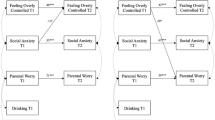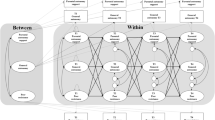Abstract
Theory and research indicate considerable changes in parental control across adolescence (e.g., declining behavioral control), but the developmental course and significance of psychological control remains largely unknown. This study examined trajectories of adolescents’ reports of mothers’ and fathers’ psychological control from ages 12 to 19, predictors of occupying distinct trajectories, and the developmental significance of these trajectories for adolescents’ development of depressive and anxiety symptoms. It used eight waves of survey data on 500 adolescents (Mage = 11.83, SD = 1.03; 52% female; 67% White, 12% African American) and their parents from the Pacific Northwest United States. Most adolescents (about 90%) reported low but increasing levels of parental psychological control over time, with a small but significant subset (about 10%) perceiving perpetually elevated levels. Mothers’ (but not fathers’) depressive symptoms, reported at the age 12 assessment, predicted adolescents’ membership in the elevated psychological control trajectory. Adolescents occupying these elevated trajectories showed more problematic growth in depressive and anxiety symptoms across adolescence. Taken together, the findings suggest that many adolescents experience increased parental psychological control as they age, and that variability in these trends indicates individual differences in their development of depressive and anxiety symptoms over time.



Similar content being viewed by others
References
Akaike, H. (1973). Information theory and an extension of the maximum likelihood principle. In B. N. Petrov & F. Csaki (Eds), Second international symposium on information theory (pp. 267–281). Budapest: Academiai Kiado.
Akaike, H. (1981). Likelihood of a model and information criteria. Journal of Econometrics, 16(1), 3–14. https://doi.org/10.1016/0304-4076(81)90071-3.
Asparouhov, T., & Muthén, B. (2012). Using Mplus TECH11 and TECH14 to test the number of latent classes. Mplus Web Notes, 14, 22.
Barber, B. K. (1996). Parental psychological control: revisiting a neglected construct. Child Development, 67(6), 3296–3319. https://doi.org/10.2307/1131780.
Barber, B. K., Stolz, H. E., Olsen, J. A., & Maughn, S. L. (2005a). Parental support, psychological control, and behavioral control: assessing relevance across time, culture, and method. Monographs of the Society for Research in Child Development, 70(4). https://doi.org/10.1111/j.1540-5834.2005.00369.x.
Barber, B. K., Stolz, H. E., Olsen, J. A., & Maughan, S. L. (2005b). Responsiveness, psychological control, and behavioral control: assessing relevance across time, method, and culture. Monographs of the Society for Research in Child Development, 70 (7, Serial No. 276).
Cummings, M. E., Keller, P. S., & Davies, P. T. (2005). Toward a family process model of maternal and paternal depressive symptoms: exploring multiple relations with child and family functioning. Journal of Child Psychology and Psychiatry, 46(5), 479–789. https://doi.org/10.1111/j.1469-7610.2004.00368.x.
De Los Reyes, A., Goodman, K. L., Kliewer, W., & Reid-Quiñones, K. (2009). The longitudional consistency of mother-child reporting discrepancies and parental monitoring and their ability to predict child delinquent behaviors two years later. Journal of Youth and Adolescence, 39(12), 1417–1430. https://doi.org/10.1007/s10964-009-9496-7.
Deci, E. L., & Ryan, R. M. (2012). Self-determination theory. In P. A. M. Van Lange, A. W. Kruglanski & E. T. Higgins (Eds), Handbook of theories of social psychology (pp. 416–433). Thousand Oaks, CA: Sage.
Desjardins, T., & Leadbeater, B. J. (2017). Changes in parental emotional support and psychological control in early adulthood: direct and indirect associations with educational and occupational adjustment. Emerging Adulthood, 5(3), 177–190. https://doi.org/10.1177/2167696816666974.
Dietvorst, E., Hiemstra, M., Hillegers, M. H., & Keijsers, L. (2018). Adolescent perceptions of parental privacy invasion and adolescent secrecy: an illustration of Simpson’s paradox. Child Development, 89(6), 2081–2090. https://doi.org/10.1111/cdev.13002.
Dishion, T. J., & McMahon, R. J. (1998). Parental monitoring and the prevention of child and adolescent problem behavior: a conceptual and empirical formulation. Clinical Child and Family Psychology Review, 1(1), 61–75. https://doi.org/10.1023/A:1021800432380.
Enders, C. K. (2010). Applied missing data analysis. New York, NY: Guilford Press.
Essau, C. A., Muris, P., & Ederer, E. M. (2002). Reliability and validity of the Spence Children’s Anxiety Scale and the Screen for Child Anxiety Related emotional disorders in German children. Journal of Behavior Therapy and Experimental Psychiatry, 33(1), 1–18. https://doi.org/10.1016/S0005-7916(02)00005-8.
Grimm, K. J., Ram, N., & Estabrook, R. (2017). Growth modeling: Structural equation and multilevel modeling approaches. New York, NY: Guilford Publications.
Janssens, A., Van Den Noortgate, W., Goossens, L., Colpin, H., Verschueren, K., Claes, S., & Van Leeuwen, K. (2017). Externalizing problem behavior in adolescence: parenting interacting With DAT1 and DRD4 genes. Journal of Research on Adolescence, 27(2), 278–297. https://doi.org/10.1111/jora.12271.
Keijsers, L., & Poulin, F. (2013). Developmental changes in parent–child communication throughout adolescence. Developmental Psychology, 49(12), 2301–2308. https://doi.org/10.1037/a0032217.
Keijsers, L., Voelkle, M. C., Maciejewski, D., Branje, S., Koot, H., Hiemstra, M., & Meeus, W. (2016). What drives developmental change in adolescent disclosure and maternal knowledge? Heterogeneity in within-family processes. Developmental Psychology, 52(12), 2057–2070. https://doi.org/10.1037/dev0000220.
King, K. M., Littlefield, A., McCabe, C., Mills, K. L., Flournoy, J., & Chassin, L. (2017). Longitudinal modeling in developmental neuroimaging research: common challenges, and solutions from developmental psychology. Developmental Cognitive Neuroscience, 33, 54–72. https://doi.org/10.1016/j.dcn.2017.11.009.
Little, R. J. (1988). A test of missing completely at random for multivariate data with missing values. Journal of the American Statistical Association, 83(404), 1198–1202. https://doi.org/10.1080/01621459.1988.10478722.
Luyckx, K., Soenens, B., Vansteenkiste, M., Goossens, L., & Berzonsky, M. D. (2007). Parental psychological control and dimensions of identity formation in emerging adulthood. Journal of Family Psychology, 21(3), 546–550. https://doi.org/10.1037/0893-3200.21.3.546.
Makol, B. A., De Los Reyes, A., Ostrander, R. S., & Reynolds, E. K. (2019). Parent-Youth divergence (and convergence) in reports of youth internalizing problems in psychiatric inpatient care. Journal of Abnormal Child Psychology. https://doi.org/10.1007/s10802-019-00540-7
Meter, D. J., Ehrenreich, S. E., & Underwood, M. K. (2019). Relations between parent psychological control and parent and adolescent social aggression. Journal of Child and Family Studies, 28(1), 140–151. https://doi.org/10.1007/s10826-018-1240-z.
Muthén, L. K., & Muthén, B. O. (1998–2018). Mplus user’s guide. Seventh edition Los Angeles: Muthén & Muthén.
Pettit, G. S., Laird, R. D., Dodge, K. A., Bates, J. E., & Criss, M. M. (2001). Antecedents and behavior‐problem outcomes of parental monitoring and psychological control in early adolescence. Child Development, 72(2), 583–598. https://doi.org/10.1111/1467-8624.00298.
Radloff, L. S. (1977). Center for Epidemiological Studies Depression Scale. PsycTESTS. https://doi.org/10.1037/t02942-000
Rogers, A. A., Memmott-Elison, M. K., Padilla-Walker, L. M., & Byon, J. (under review). Perceived parental psychological control predicts intra-individual decrements in self-regulation across adolescence.
Smetana, J. G., Metzger, A., Gettman, D. C., & Campione‐Barr, N. (2006). Disclosure and secrecy in adolescent–parent relationships. Child Development, 77(1), 201–217. https://doi.org/10.1111/j.1467-8624.2006.00865.x.
Soenens, B., Luyckx, K., Vansteenkiste, M., Duriez, B., & Goossens, L. (2008). Clarifying the link between parental psychological control and adolescents’ depressive symptoms: reciprocal versus unidirectional models. Merrill-Palmer Quarterly, 54(4), 411–444. https://doi.org/10.1353/mpq.0.0005.
Soenens, B., & Vansteenkiste, M. (2010). A theoretical upgrade of the concept of parental psychological control: proposing new insights on the basis of self-determination theory. Developmental Review, 30(1), 74–99. https://doi.org/10.1016/j.dr.2009.11.001.
Soenens, B., Vansteenkiste, M., & Beyers, W. (2019). Parenting adolescents. In M. Bornstein (Ed.), Handbook of parenting (3rd edtion), Vol. 1: Children and parenting (pp. 101–167). New York, NY: Routledge.
Spence, S. H. (1998). A measure of anxiety symptoms among children. Behaviour Research and Therapy, 36(5), 545–566.
Steeger, C. M., & Gondoli, D. M. (2013). Mother–adolescent conflict as a mediator between adolescent problem behaviors and maternal psychological control. Developmental Psychology, 49(4), 804–814. https://doi.org/10.1037/a0028599.
Stockings, E., Degenhardt, L., Lee, Y. Y., Mihalopoulos, C., Liu, A., Hobbs, M., & Patton, G. (2015). Symptom screening scales for detecting major depressive disorder in children and adolescents: a systematic review and meta-analysis of reliability, validity and diagnostic utility. Journal of Affective Disorders, 174, 447–463. https://doi.org/10.1016/j.jad.2014.11.061.
Taraban, L., Shaw, D. S., Leve, L. D., Wilson, M. N., Dishion, T. J., Natsuaki, M. N., Neiderhiser, J. M., & Reiss, D. (2017). Maternal depression and parenting in early childhood: contextual influence of marital quality and social support in two samples. Developmental Psychology, 53(3), 436–449. https://doi.org/10.1037/dev0000261.
Van Lissa, C. J., Keizer, R., Van Lier, P. A. C., Meeus, W. H. J., & Branje, S. (2019). The role of fathers’ versus mothers’ parenting in emotion-regulation development from mid–late adolescence: disentangling between-family differences from within-family effects. Developmental Psychology, 55(2), 377–389. https://doi.org/10.1037/dev0000612.
Wang, Q., Pomerantz, E.M., Chen, H. (2007) The Role of Parents? Control in Early Adolescents? Psychological Functioning: A Longitudinal Investigation in the United States and China. Child Development 78(5):1592–1610. https://doi.org/10.1111/j.1467-8624.2007.01085.x.
Weissman, M. M., Orvaschel, H., & Padian, N. (1980). Children’s symptom and social functioning self-report scales: comparison of mothers’ and children’s reports. Journal of Nervous Mental Disorders, 168(12), 736–740. https://doi.org/10.1097/00005053-198012000-00005.
Werner, L. L. A. A., der Graaff, J. V., Meeus, W. H. J., & Branje, S. J. T. (2016). Depressive symptoms in adolescence: longitudinal links with maternal empathy and psychological control. Journal of Abnormal Child Psychology, 44(6), 1121–1132. https://doi.org/10.1007/s10802-015-0106-8.
Yap, M. B., Allen, N. B., & Ladouceur, C. D. (2008). Maternal socialization of positive affect: the impact of invalidation on adolescent emotion regulation and depressive symptomatology. Child Development, 79(5), 1415–1431. https://doi.org/10.1111/j.1467-8624.2008.01196.x.
Authors’ Contributions
AR conceived of the study, performed the statistical analyses and interpretation of results, and led the writing of the manuscript; LPW conceived of the study and assisted in the interpretation of results and the writing of the manuscript; RM assisted with data analysis and writing of the manuscript; JH assisted with data analysis and writing of the manuscript. All authors read and approved the final manuscript.
Data Sharing and Declaration
This manuscript’s data will not be deposited.
Author information
Authors and Affiliations
Corresponding author
Ethics declarations
Conflict of Interest
The authors declare that they have no conflict of interest.
Ethical Approval
All procedures involving human participants were performed in accordance with the ethical standards of the institution and/or national research committee and with the 1964 Helsinki declaration and its later amendments or comparable ethnical standards.
Informed Consent
All adolescents and parents in the study assented to participation; consent was obtained from each participants’ primary caregiver.
Additional information
Publisher’s note: Springer Nature remains neutral with regard to jurisdictional claims in published maps and institutional affiliations.
Supplementary information
Appendix A
Appendix A
Table 5
Rights and permissions
About this article
Cite this article
Rogers, A.A., Padilla-Walker, L.M., McLean, R.D. et al. Trajectories of Perceived Parental Psychological Control across Adolescence and Implications for the Development of Depressive and Anxiety Symptoms. J Youth Adolescence 49, 136–149 (2020). https://doi.org/10.1007/s10964-019-01070-7
Received:
Accepted:
Published:
Issue Date:
DOI: https://doi.org/10.1007/s10964-019-01070-7




